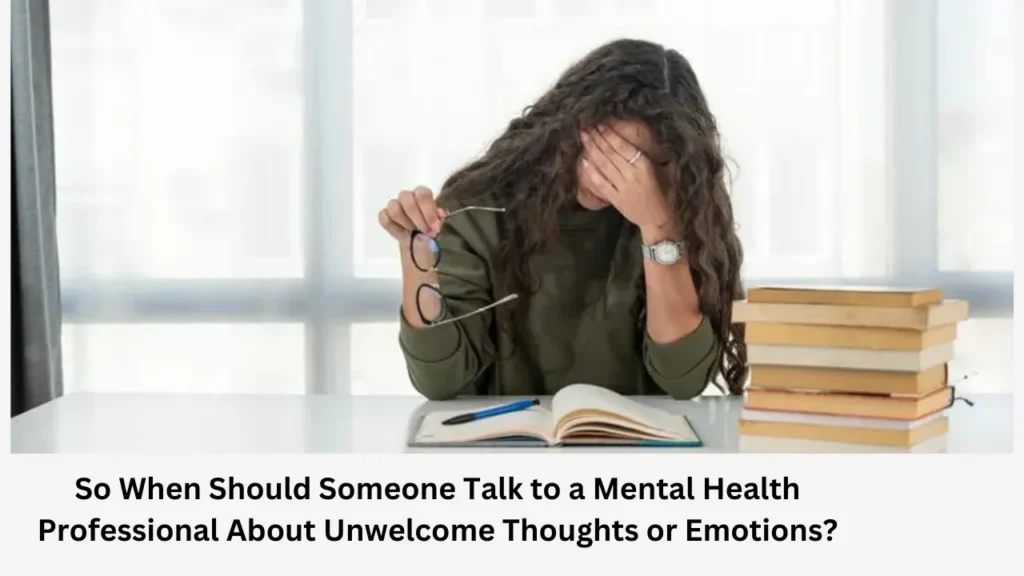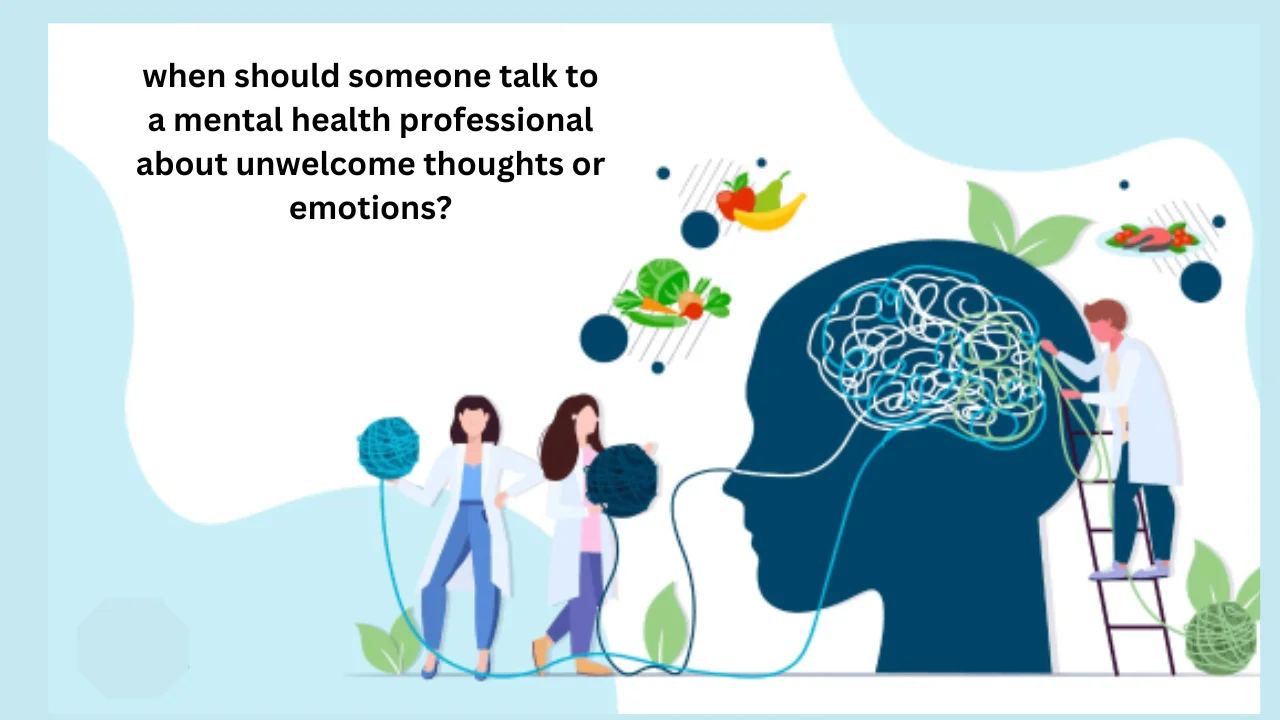Unwelcome thoughts and emotions are a part of human experience. However, it’s crucial to understand when should someone talk to a mental health professional about unwelcome thoughts or emotions to prevent these feelings from disrupting life. While occasional negative thoughts are normal, persistent or overwhelming emotions may require professional help. This article explores the signs, situations, and reasons to seek professional guidance.
What is when should someone talk to a mental health professional about unwelcome thoughts or emotions?
When should someone talk to a mental health professional about unwelcome thoughts or emotions? refers to recognizing the right time to seek help from a mental health professional when dealing with distressing or disruptive thoughts and emotions. It involves identifying specific signs, such as persistent intrusive thoughts, overwhelming emotions, changes in behavior, or difficulty coping with everyday stressors, that indicate professional guidance is needed to improve mental well-being and quality of life.
Unwelcome Thoughts and Emotions
Unwelcome thoughts can be intrusive and disturbing. They might appear suddenly, making a person feel confused, anxious, or distressed. Similarly, emotions such as sadness, anger, or anxiety can become overwhelming and unmanageable. These experiences can affect one’s daily routine, relationships, and overall mental well-being. Knowing when should someone talk to a mental health professional about unwelcome thoughts or emotions is key to managing these issues effectively.
Signs That Indicate a Need for Professional Help
Recognizing the signs that indicate the need to talk to a mental health professional is essential. Here are some common indicators:
Persistent Thoughts:
If unwelcome thoughts are persistent and intrusive, disrupting daily activities and causing distress, it’s time to seek help.
Overwhelming Emotions:
Experiencing intense emotions, such as extreme sadness, anger, or anxiety, for an extended period is a sign.
Changes in Behavior:
Significant changes in eating, sleeping, or social habits may indicate underlying mental health issues.
Struggling with Coping Mechanisms:
When someone struggles to cope with stressors that previously were manageable, it’s advisable to consult a professional.
So When Should Someone Talk to a Mental Health Professional About Unwelcome Thoughts or Emotions?

Understanding the exact moment to seek help can be challenging. It’s essential to know that reaching out for help is not a sign of weakness but a step towards mental well-being. Here are some specific scenarios:
When Thoughts Interfere with Daily Life
If thoughts or emotions are so overwhelming that they interfere with daily tasks, it’s time to talk to a professional. For example, if unwelcome thoughts make it difficult to concentrate at work or school, it’s a clear sign that professional support is needed.
Experiencing Physical Symptoms
Mental health issues often manifest physically. Symptoms like headaches, stomach problems, or unexplained pain can indicate that someone needs to discuss their thoughts or emotions with a professional. These symptoms can become more severe if ignored, leading to more significant health issues.
Feelings of Hopelessness
Feeling hopeless or believing that things will never get better is a serious indication to seek help. Such emotions can lead to self-harm or suicidal thoughts, requiring immediate professional intervention.
Difficulty in Relationships
When unwelcome thoughts or emotions cause strain in personal or professional relationships, it’s crucial to talk to a mental health professional. Misunderstandings, conflicts, or withdrawal from loved ones are signs that support is needed.
Sudden Mood Swings
Experiencing sudden and intense mood swings can be a sign of underlying mental health issues. If these mood swings are frequent and affect one’s ability to function normally, professional help should be considered.
Using Substances to Cope
If someone is using alcohol, drugs, or other substances to cope with their emotions or thoughts, it’s a red flag. Talking to a mental health professional can help address the root cause and develop healthier coping mechanisms.
The Role of Mental Health Professionals
Mental health professionals, such as therapists, psychologists, and counselors, are trained to help individuals navigate their thoughts and emotions. They use various techniques, including cognitive-behavioral therapy (CBT), mindfulness, and medication, to support individuals. Understanding when should someone talk to a mental health professional about unwelcome thoughts or emotions is essential for accessing these beneficial resources.
Therapists and Counselors
Therapists and counselors offer a safe space to discuss feelings and thoughts. They can help identify triggers, develop coping strategies, and provide emotional support. They are often the first point of contact for individuals seeking help.
Psychologists
Psychologists specialize in diagnosing and treating mental health disorders. They use evidence-based therapies, such as CBT, to address issues like anxiety, depression, and PTSD. Consulting a psychologist is beneficial when unwelcome thoughts or emotions are persistent and disruptive.
Psychiatrists
Psychiatrists are medical doctors who can prescribe medication for mental health issues. They are essential when therapy alone is not sufficient. Medication can help manage symptoms, making it easier for individuals to engage in therapy effectively.
How to Start the Conversation
Initiating a conversation with a mental health professional can be daunting. Here are some steps to make the process easier:
Acknowledge the Need for Help:
The first step is recognizing that professional help is necessary. Understanding when should someone talk to a mental health professional about unwelcome thoughts or emotions can make this step more accessible.
Choose the Right Professional:
Depending on the nature of the issue, decide whether to consult a therapist, psychologist, or psychiatrist.
Prepare for the Session:
List down thoughts, emotions, and situations that have been challenging. This preparation can make the conversation more productive.
Be Open and Honest:
It’s crucial to be honest about thoughts and emotions during the session. Mental health professionals are there to help, and they can only do so with complete information.
Benefits of Talking to a Mental Health Professional
Talking to a mental health professional has numerous benefits. It provides a safe space to express feelings, offers strategies to cope with challenging emotions, and helps in understanding and managing mental health issues. Here are some key benefits:
Better Emotional Regulation:
Learning how to manage emotions effectively can improve overall well-being and relationships.
Improved Coping Strategies:
Professionals teach healthy coping mechanisms to deal with stress, anxiety, and other challenges.
Enhanced Self-Awareness:
Therapy can help individuals understand their thoughts, emotions, and behaviors better.
Reduction in Symptoms:
Professional help can significantly reduce symptoms of mental health disorders, improving quality of life.
| Situation | Seek Help | Not to Worry |
|---|---|---|
| Persistent intrusive thoughts | Yes, if they disrupt daily activities | No, if they are occasional and manageable |
| Extreme sadness or anxiety | Yes, if it lasts more than two weeks | No, if it’s brief and situational |
| Difficulty in maintaining relationships | Yes, if it leads to isolation or conflicts | No, if it’s occasional misunderstandings |
| Using substances to cope | Yes, if reliance is increasing | No, if it’s casual and controlled |
| Sudden changes in sleep or eating patterns | Yes, if it affects health or daily routine | No, if it’s due to temporary stress |
Frequently Asked Questions
What are unwelcome thoughts?
Unwelcome thoughts are intrusive and unwanted ideas or images that can cause distress. They often appear suddenly and are difficult to control.
How can a mental health professional help with overwhelming emotions?
A mental health professional can provide coping strategies, therapeutic techniques, and, if needed, medication to help manage overwhelming emotions effectively.
Is it normal to have unwelcome thoughts occasionally?
Yes, it is normal to have unwelcome thoughts occasionally. However, if they are persistent and disrupt your daily life, it may be time to seek professional help.
Final Thoughts
Understanding when should someone talk to a mental health professional about when should someone talk to a mental health professional about unwelcome thoughts or emotions?. It’s important to recognize the signs and take proactive steps to seek help. Mental health professionals provide the necessary support and tools to manage emotions and thoughts effectively. If you or someone you know is struggling, don’t hesitate to reach out for help. Remember, seeking help is a step toward a healthier and happier life.
